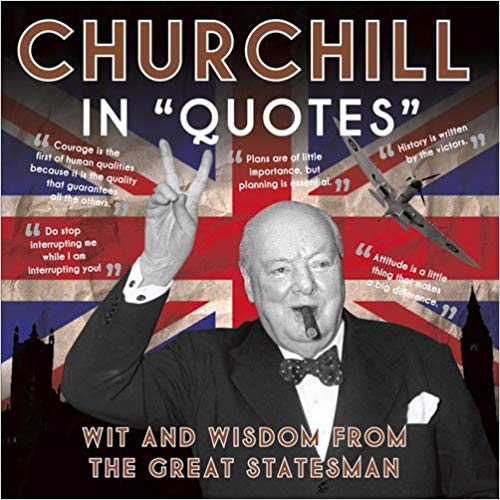
Churchillian Fiction Continues to Roll off the Presses
Churchill quotes in the realm of fiction are a well-known feature of the popular culture. So good an aphorist was Churchill that even posthumously, he continues to “manufacture” quote fiction. Sometimes it’s the work of an obscure figure, pinned on Churchill to make it more interesting.
The scholar Manfred Weidhorn has an explanation for what we call Churchillian (or Yogi Berra) Drift: “You do not find yourself the target of Churchillian Drift unless, like Churchill, you are already a fine aphorist. Part of the reason it’s so easy to misattribute brilliant sayings to great aphorists is that they have already coined so many brilliant sayings themselves.”
The Amazon link for the above title is not provided. That’s because I don’t recommend you buy this book, which I strongly suspect is full of fiction. Ah, you say, so instead you’re plugging your own quote books? Au contraire…
Non – fiction Recommendations
Forget me and look around for two fine quotation books—oldies but goodies. Each was compiled by someone who knew Churchill intimately. Sir Colin Coote’s Maxims and Reflections of the Rt Hon Winston S. Churchill was first published in 1947 and saw many printings. Kay Halle’s Irrepressible Churchill (1966) has had several editions as late as 2011.
Neither book is 100% perfect (nor are mine). But they are highly reliable. (Be sure to search Bookfinder for first editons and used copies other than Amazon’s.)
The book displayed above bedizens its cover with five alleged quotations. Not one is a true Winston Churchill quote. This must be a world record or sorts. Of course, it’s in the Bush League compared to A-Z Quotes, an Internet-based cornucopia of fiction.
“Interrupting”
Just for the sake of pedantry, the “Interrupting” quote on the book cover comes close, and a lenient teacher might allow it a “D.” What Churchill actually said was to his son: “Randolph, do not interrupt me while I’m interrupting!” (Circa 1930s, at the Chartwell dinner or luncheon. See Martin Gilbert, Winston Churchill: The Wilderness Years, 13.)
On interrupting, he also offered self-criticism: “All the years that I have been in the House I have always said to myself one thing: ‘Do not interrupt,’ and I have never been able to keep to that resolution.” (Hansard, Parliamentary Debates, House of Commons, 10 July 1935,)
As you can see, attribution is the key to getting quotes right. Never trust any Churchill quip that is not accompanied by a note to a reliable source.
“Courage”
The other WSC quotes on the cover above are pure fiction. Churchill did voice the “Courage” quote, but the cover leaves out his acknowledgement of a prior author. What he actually said was: “Courage is rightly esteemed the first of human qualities because, as has been said, it is the quality which guarantees all others.” (“Alfonso the Unlucky,” Strand Magazine, July 1931, reprinted in Great Contemporaries. Emphasis mine.)
In referring to an earlier author Churchill was perhaps thinking of Dr. Samuel Johnson. “Sir, you know courage is reckoned the greatest of all virtues; because, unless a man has that virtue, he has no security for preserving any other.” If so, Churchill’s editing improved on Johnson.
Fiction Compiled
As a public service, I provide on this website a multi-part compilation of every fake Churchill quote I have read or been notified about. To the original “Red Herrings” appendix in Churchill by Himself, this list includes every new fiction encountered since. I have now compiled close to 150. There is no shortage of material. It keeps me off the streets.







One thought on “Churchillian Fiction Continues to Roll off the Presses”
You write: “In referring to an earlier author Churchill was perhaps thinking of Dr. Samuel Johnson. ‘Sir, you know courage is reckoned the greatest of all virtues; because, unless a man has that virtue, he has no security for preserving any other.'” We can see the ancestry of this idea in Cicero as well and other authors but Churchill’s is closest to Johnson and yes, his paraphrase polishes and improves upon the original idea. That is an aspect of Churchill’s literary talent. He understood the idea and communicated it in a euphonious and often original way.
Comments are closed.